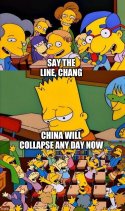For the millionth time
"
China is experiencing a slow-motion economic crisis that could undermine stability in the current regime and have serious negative consequences for the global economy. Despite the many warning signs, Western analysts and policy makers are optimistic that Xi Jinping is up to the task of managing the crisis. Such optimism is misplaced.
The U.S. and its allies have many tools to influence China’s economy and need to weigh the consequences of an acute crisis against the threat its current trajectory poses to the U.S. Policy makers should be thinking of how best to deploy these tools, instead of passively assuming the rapid growth and stability of the Chinese economy will continue.
In December real-estate developers China
and Kaisa joined several other overleveraged firms in bankruptcy, exposing hundreds of billions in yuan- and dollar-denominated debt to default. Real estate represents around 30% of the Chinese economy, nearly twice the levels that led to the financial crisis of 2008-09 in the U.S., Spain and England.
The real-estate industry has been key to keeping annual growth above 6%. Yet a debt bubble has inflated by 20% annually
. Originally intended to accommodate rapid urbanization for the industrial economy, the urban property market is now overbuilt. Some 90% of urban households own their own properties and enough vacant units are available to accommodate 10 years of urban immigrants. Sales and prices have tumbled this year, and overleveraged builders and creditors are suffering the consequences.
NEWSLETTER SIGN-UP
Opinion: Morning Editorial Report
All the day's Opinion headlines.
PREVIEW
SUBSCRIBE
WSJ NEWSLETTER
Notes on the News
The news of the week in context.
I would also like to receive updates and special offers from Dow Jones and affiliates. I can unsubscribe at any time.I agree to the
and
.
After a major change in how central and local governments divvy up tax revenue in 1994, Chinese local officials began to rely on land sales for the income needed for improving infrastructure and social welfare. At a minimum, one-third of local government revenues is derived from land sales. Another 10% to 15% come from related taxes on development.
But land sales fell by more than 30% in late 2021, putting local finances in jeopardy. Local governments have struggled to address other priorities such as healthcare, pensions, environmental cleanup, income inequality and education. Moreover, up to 80% of household wealth in China is in real estate holdings, a hedge against weakness of the social safety net. In other words, an economic meltdown is a potential threat to the implicit social compact in China between authoritarian rulers and a quiescent population.
In his zeal to reassert the dominance of the Chinese Communist Party, Mr. Xi has engineered a crackdown on some of China’s most innovative industries and the entrepreneurs building them. The party channels credit to state-owned enterprises to the detriment of the more dynamic and job-creating private industry, inserts operatives on the management committees of most enterprises, and disciplines business leaders perceived to resist Mr. Xi’s leadership. The clampdown on new industries such as ride-sharing, private education, social media and online and private healthcare, is especially damaging to growth.
Mr. Xi is privileging the less productive and less innovative components of the Chinese economy while enhancing control, limiting financing and punishing entrepreneurial leaders in many leading industries. This isn’t a recipe for maintaining strong economic growth. Despite the frequent assertions that China is catching up or moving ahead of the West in technology industries, it has a long way to go to achieve the self-sufficiency and global leadership it seeks. U.S. sanctions on advanced semiconductors, for instance, have gutted Huawei’s ability to make its own 5G phones. China’s semiconductor industry is 10 years behind world leaders, according to a recent German
.
China’s commercial aviation industry doesn’t have an internationally certified jet to compete with
and
, despite three decades of concentrated efforts. Its biopharmaceutical industry failed to produce an effective vaccine for Covid. Steel, batteries and high-speed rail—where China is competitive—are at risk of trade retaliation due to environmentally harmful production practices and theft of intellectual property. China’s alleged lead in artificial intelligence could be blunted by imposing the same limits on data flows into China that it imposes internally, thus sapping its monopoly on big data, and by limiting U.S. investment in Chinese AI firms.
China’s overall productivity levels also lag those of other advanced economies. Mr. Xi’s turn to state-owned enterprises and manufacturing certainly won’t improve this relative weakness.
In short, it is difficult to escape the conclusion that China’s economy is systematically weakening and that Mr. Xi’s new priorities offer little hope for a quick turnaround. The U.S. and its allies could further compound Mr. Xi’s challenges by vigorous enforcement of trade laws, limiting Chinese access to technology and financing from the West, and imposing sanctions against China’s brutal human-rights abuses in Xinjiang and in countries in the developing world that it is trying to exploit through its Belt and Road Initiative. A good example of such exploitation is the atrocious mining conditions for key battery components cobalt and lithium in Africa and South America.
A major slowdown or acute financial crisis in China would certainly have a negative impact on the global economy. But U.S. and allied policy makers do have tools that could both influence the direction of the Chinese economy and help repair some of the accumulated damage to their economies from Chinese mercantilism. A first step is to undermine the narrative of a relentless, unstoppable economic advance under Mr. Xi’s leadership.
Mr. Duesterberg is a senior fellow at the Hudson Institute and author of a new study, “”
"

